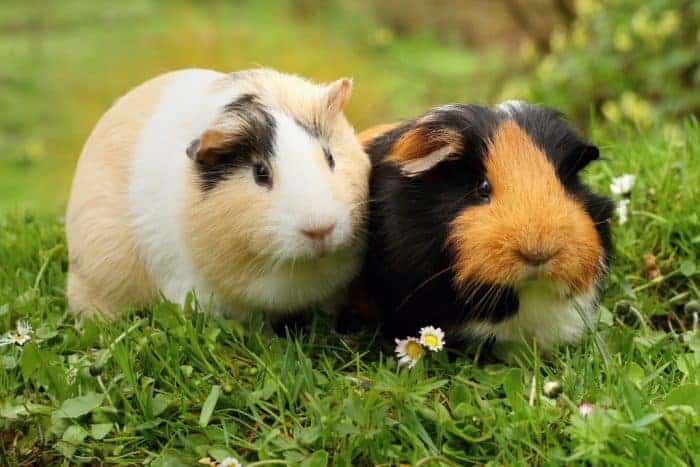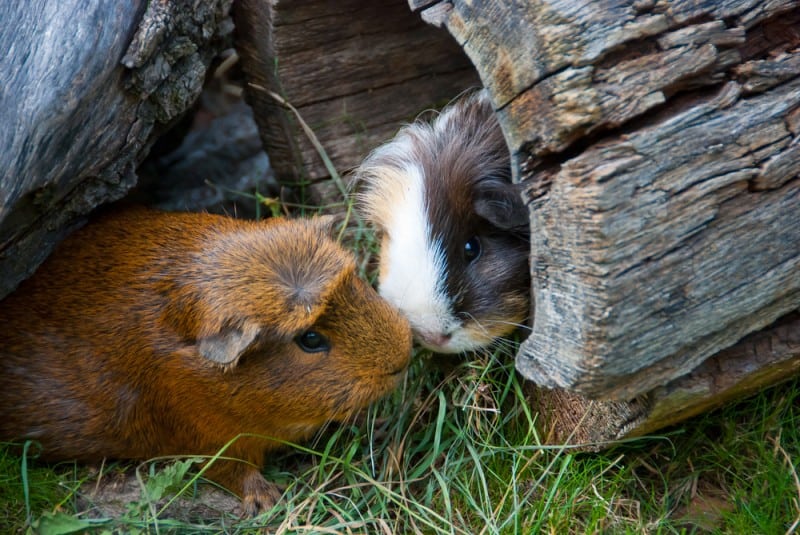Pet guinea pigs are active, curious animals that can make great companions. Understanding their behavior will help you build a stronger relationship with your guinea pig.

But do guinea pigs behave strangely, and why?
Yes, guinea pigs can exhibit various types of weird or unusual behaviors. These behaviors can often be attributed to their natural instincts, communication methods, or health issues.
Learning to interpret these behaviors can instantly create an unbreakable bond between you and your furry little friend. Keep reading to learn more.
Understanding Guinea Pig Behavior
Here’s a guide for some of the behaviors your guinea pig may exhibit:
Vocal Communication
Guinea pigs may seem like quiet creatures, but they use loud noises to express themselves. Understanding vocal communication is critical to understanding your critter companion. Here are some examples:
Whistling
Guinea pigs will let out a high-pitched whistle or squeal, and this noise means your pet is excited about feeding time or playtime.

Purring
Another common guinea pig sound is the purr, which can make them sound like a cat. These purrs have different meanings. A deep, relaxed purr means your guinea pig is content, and a higher-pitched one is a sound of annoyance.
A shorter-sounding, anxious purr may mean fear. Alternately, guinea pigs can signal fear by a high-pitched squeak or shriek.
Hissing
This sound also sounds like chattering teeth and signifies that your guinea pig is angry or aggressive.
Chirping
One unusual guinea pig sound you may notice is a chirping noise, often made when your pet is in a trance-like state. This mysterious and strange behavior is not fully understood but is more common in guinea pigs that have lost a partner.

Physical Communication
Besides vocal communication, pet guinea pigs can also express themselves using non-verbal communication. Interpreting this behavior can help you understand more about your pet guinea pig.
Signs of Friendliness
If your guinea pig is happy with you, he will find ways to express this with his body language. A common sign of happiness and friendliness is rapid hopping up and down, similar to popcorn popping.
Another sign of happiness is rubbing noses, which guinea pigs often do to each other. Licking is another friendly signal.
Signs of Aggression
If your guinea pig is scared or unhappy, he will express this. Fidgeting, freezing, or throwing his head up in the air means he is uncomfortable or scared. Teeth baring and hissing, strutting, and hair fluffing are also signs of aggression.
Socializing
As mentioned earlier, guinea pigs are social creatures and thrive with other guinea pigs around. They enjoy interacting and playing with each other. If you have a single guinea pig, you must spend more time with him.
Socializing and playtime are essential parts of a guinea pig’s life, and if neglected, it could lead to depression or stress.

Signs of Anxiety and Depression
If your guinea pig is feeling depressed or stressed, his behavior will reflect this. A stressed guinea pig will show signs of aggression and irritability. He will display hostile behavior such as fidgeting, head-tossing, or teeth-baring.
On the other hand, a depressed guinea pig will not display much energy. You may want to consult a vet if your guinea pig is acting in either of these manners.
Guinea Pig Behavior Myths

Here, we reveal the truth of five behavior myths you’ve heard about guinea pigs.
Myth 1: Guinea Pigs Cannot Bond
Truth: Contrary to popular belief, guinea pigs are sociable creatures. They enjoy the company of people and other guinea pigs. Due to their timid nature, they may not open up to humans immediately and may seem distant when you bring them home. However, you will need patience before guinea pigs show you some love.
You can start building a bond with your guinea pig by placing their cage near you. As curious animals, enjoy watching your daily activities. They will feel closer to you when they are familiar with your presence.
Myth 2: Guinea Pigs Cannot Be Spayed/Neutered
Truth: Guinea pigs aren’t different from other pets, such as dogs or cats. They need to go through the same sterilization procedure. If you intend to keep guinea pigs of different genders, you should neuter them to prevent unwanted pregnancies.
However, there are risks associated with any surgery, so it is important to seek advice from a veterinarian. Find out about the procedures and post-surgery care to prevent any infections.

Myth #3: One Guinea Pig Bonds Better Than Two
Quite a few new pet parents avoid adopting pairs for fear that guinea pigs won’t be able to form a strong bond. The truth is that the strength of the bond relies on the frequency of interaction between guinea pigs and humans. By interaction, we mean things like:
- Snuggling in front of your TV
- Playing in an open area
- Frequently reaching into their cage to scratch behind pig’s ears
- Talking to the guinea pig
- Hand-feeding treats
- Providing lap time while you read your e-mail
You can have a strong bond with five guinea pigs if you interact with them daily.
Guinea pigs are communal animals that are healthier and happier when they live with other companions. Lone pigs are more prone to stress and depression.
Depression can also contribute to decreased immune system function, which leads to an increased risk for disease. No matter how many hours a day you spend with your pigs, you simply cannot justify the absence of another guinea pig.
Myth 4: Guinea Pigs Are Low-Maintenance Pets
Truth: Owning a pet has a set of responsibilities, and it is no different for guinea pigs. Most of us may want to adopt a guinea pig because it requires less work than cats or dogs, but that’s not true.
Guinea pigs are a long-term commitment as they can live up to eight years old. They do not require regular walks like dogs, but they require bedding, water, food, toys, vitamin C supplements, and daily cage cleaning. They also require a lot of attention.
Hereditary problems like dental problems may plague guinea pigs, and you may need to pay hefty veterinary fees.
Myth 5: Guinea Pigs Don’t Need a Big Open Space
Truth: You may assume that a regular-sized cage (24×12 inches) at a pet store is adequate for a guinea pig, but that’s not true. They are much larger and require a bigger space to romp around.
The recommended size for a guinea pig is 30 by 36 inches. A confined area can cause distress to guinea pigs.
Keeping Guinea Pigs Happy – What Do They Need

Keep your guinea pigs on their best behavior by satisfying all their needs. Guinea pigs require access to everything they require at all times. This includes open space, food, water, safe hiding places, toys, and companion guinea pigs.
- Guinea pigs need safe toys to play with and chew. They also need regular opportunities to play with other guinea pigs or people. They’re inquisitive creatures and may suffer if they are bored.
- They love hiding and need constant access to safe hiding places, pipes, and shelters.
- Opportunities to exercise every day to stay healthy.
- Guinea pigs are energetic pets and need frequent opportunities to stay active.
- Suitable materials to satisfy their tunneling instincts, such as pipes and deep areas of hay.
- Guinea pigs need you to be observant. Take note of your pet’s behavioral changes and seek advice from a vet or animal behaviorist. Guinea pigs’ behavior depends on their age, personality, and past experiences. Guinea pigs that are frightened or injured may change their behavior and develop unwanted habits such as aggression.
- They need love and kindness from their pet parents. Always be quiet and gentle around your pets. You should never shout at or punish guinea pigs. They are likely to become nervous and stop eating. If your guinea pig’s behavior becomes an ongoing problem, seek expert advice from a local vet.
Frequently Asked Questions
Do guinea pigs enjoy petting?
Most guinea pigs enjoy a good scratch behind their ears or gentle petting on their back. Find the level of touch your pet is most comfortable with, and he will grow to relish his time out of the cage.
Are guinea pigs aggressive?
Guinea pigs are energetic, social animals and are happy living with other cavies. However, sometimes they can become aggressive for different reasons discussed above.
Do guinea pigs miss their human owners?
The answer is yes. Guinea pigs can form heartfelt bonds with their owners and miss them when they are away.
